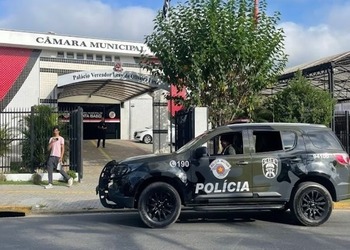A spate of arrests targeting politicians with gang links in the Brazilian state of São Paulo illustrates the ongoing evolution of the country’s largest criminal network.
In a series of raids on April 16, Brazilian authorities captured three city councilors – Ricardo Queixão of Cubatão, Flávio Batista de Souza of Vasconcelos, and Luiz Carlos Alves Dias of Santa Isabel – in addition to 10 others on suspicion of defrauding bids for municipal contracts in favor of the First Capital Command (Primeiro Comando da Capital – PCC), Brazil’s largest gang.
Two more suspects remained at large. Brazilian newspaper Folha de São Paulo reported that the detainees included officials in the state governor’s office.
The operation, led by the Special Action Group for Combating Organized Crime (Grupo de Atuação Especial de Combate ao Crime Organizado – GAECO), a special unit of the São Paulo State Public Prosecutor’s Office (Ministério Público – MP-SP), aimed to capture suspects and evidence related to supposed bid-rigging in favor of companies connected to the PCC.
The bids were related to contracts for companies providing cleaning services, inspection, and control posts, according to a statement by the MP-SP. The investigators drew from wiretaps, which eventually connected the criminal network to city councilors and other public officials “who directed bids through the control of companies,” GAECO Colonel Emerson Massera said in a press conference.
The bidders, according to government prosecutors, were either front companies or real businesses controlled by the same people. They garnered as much as 200 million reais ($38 million) in government business over the last five years, authorities said.
In the raids, authorities also seized weapons, ammunition, cellular phones, 3.5 million reais ($660,000) in checks, and some smaller denominations of cash.
“Our main objective at the moment is financial suffocation to weaken crime,” GAECO’s Flavia Flores said at the press conference.
InSight Crime Analysis
The PCC’s incursions into the world of municipal contracts suggest the group is continuing its natural evolution. The gang – which began over 30 years ago following a brutal prison riot – has steadily expanded its economic portfolio from collecting “dues” from prisoners and their families to raking in profits from facilitating international drug trafficking.
The PCC still bases its operations in the country’s prisons. But with its economic power growing, it seemed only a matter of time before the group began working with local politicians and officials – a common pattern for criminal gangs operating in the Americas.
But the PCC’s foray into municipal services and state contracts is anathema to the group’s core ideology and tradition. The PCC has an expression: o crime fortace o crime – crime strengthens crime. The saying references, among other things, how Brazil’s prison-based groups have created a kind of parallel society in which the country’s vastly unequal classes rarely cross paths and do business.
This separation held for some time. There were corrupt politicians operating high-level schemes – typified by the Lava Jato scandal – and the low-level prison-based criminal organizations like the PCC and their counterparts in Rio de Janeiro, the infamous Red Command (Comando Vermelho – CV).
But with increased economic prowess came the need to launder money, and with money laundering came the need for what Brazilians like to refer to as “factions” to interact with the elites.
“The factions need this structure to expand their operations and strengthen their illicit activities,” GAECO’s Flores said in the press conference.
SEE ALSO: In Brazil, Old Police Tactics Lead to Same Results
But while the CV remains relegated to the low echelons of crime, the PCC has moved up a notch, according to Benjamin Lessing, a professor of Political Science at the University of Chicago and an expert in Brazil’s prison gangs.
“The CV is way too wild, violent, porra louca [totally crazy] to get involved in these things,” he said in an email exchange. “But maybe the PCC is having better luck. In part because of its different structure and business model.”
Lessing said the PCC has a more sophisticated approach, such as the ability to set up front companies. He also posited that it might be easier to break into the corruption market in São Paulo than in Rio de Janeiro.
Bruno Paes Manso, who has written extensively on the PCC, told InSight Crime that the group first invested in local bus companies. These investments continue, as was evident in mid-April, when the MP-SP brought money-laundering charges against the founders of two bus companies that had been servicing as many as 700,000 riders per day at a cost of millions of reais to the government. The companies, the MP-SP claims, were formed by the PCC, which was using them to launder money from their bank robberies and drug trafficking schemes, among others.
But Paes Manso says the group has also created public service-companies related to landfills, waste management, and even has some that offer health and education services.
“The PCC follows the path of the mafia,” he said, “and has a tremendous capacity to penetrate public institutions.”
*Featured image: Police arrested 13 individuals linked to the PCC in a raid in São Paulo. Credit: Divulgação/MPSP

